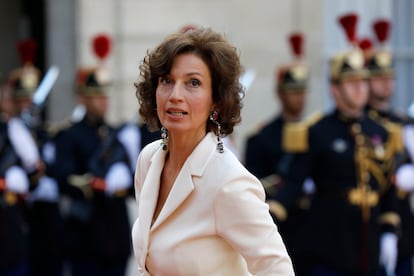The director general of UNESCO: ‘The return of the US will strengthen the organization’
The Biden administration’s decision to rejoin the UN body is a gesture in favor of multilateralism at a time when international institutions are being eroded

The return this week of the United States to the United Nations Educational, Scientific and Cultural Organization (UNESCO) represents a step forward for multilateralism at a time of rivalry between powers and contempt between some international institutions. The move will immediately represent a multimillion-dollar injection of funds for the Paris-based organization. And it can rebalance power relations with China, which takes advantage of any retreat by the rival power to reinforce its own global influence.
The U.S. departure from UNESCO on December 31, 2018, after failing to contribute to the budget for the previous seven years, was an example of the danger that Washington runs when it leaves the chair empty: this vacuum is occupied by China. Something similar happened in 2020, when in the midst of the Covid-19 pandemic, then-president Donald Trump announced that his country was leaving the World Health Organization (WHO). A year later, his successor, Joe Biden, backtracked and rejoined.
The renewed membership in UNESCO is the result of years of negotiations, but it has become effective in just a few weeks. On June 12, the U.S. formally made the request by letter. On June 30, the General Conference of the organization, which brings together the 193 member states, approved the new member by 132 votes in favor and 12 against. On Tuesday it became official, ending a hiatus of over a decade, although a major question remains: what will happen if next year’s presidential election in the U.S. is won by a candidate like Trump, hostile on principle to multilateralism and the United Nations system?
In the meantime, it’s a time of celebration for an organization often viewed as dealing with secondary issues compared with the planet’s greatest challenges. Yet UNESCO handles much more than the famous World Heritage List, and has been active since its foundation in education in developing countries and, more recently, in artificial intelligence issues. Some states have frequently used UNESCO as a battleground to settle ideological differences or power struggles.
“Budgetwise, [rejoining] is important: the U.S. will go back to being what it was, that is, the top contributor,” said Director General Audrey Azoulaya a few days ago, during a meeting with journalists at UNESCO headquarters. “What is also important is the political return, the fact that a founding State will return to UNESCO and UNESCO will lean even more towards universality with 194 members.”
The Biden administration has pledged to pay $150 million in 2024 and to ask Congress for a similar annual sum for the coming years. It is a matter of covering both its contribution to the common budget and gradually returning the back dues after eight years without contributing to the common budget, and four and a half years outside the organization. In addition, the U.S. will add a voluntary payment of $10 million for education programs on the Holocaust, journalist safety, heritage preservation in Ukraine and technological and scientific education in Africa. The total tab is for $616 million.
In 2011, under Barack Obama, the U.S. decided to stop its budgetary contribution to UNESCO due to legislation that prohibits financing U.N. organizations in which Palestine sits as a full member. Palestine joined UNESCO that same year. After coming to power in 2017, Trump precipitated the departure from an organization that, for decades, has been a favorite target of the most isolationist and unilateralist sectors of U.S. politics.
It was not the first time that Washington had slammed the door. In 1984, with Ronald Reagan in the White House, the U.S. walked out. It was at the height of the Cold War, and Reagan considered the organization corrupt and acting as a platform for Soviet influence. America returned in 2002, curiously, with another Republican who was also accused of being a unilateralist and who was preparing the invasion of Iraq at that time: George W. Bush. Then, the gesture was interpreted as a sign of goodwill towards the rest of the world.
Financial injection
By returning to UNESCO, the U.S. will provide a financial injection. And due to its political weight, it can redefine its priorities, although Azoulay does not believe that this implies a transformation of the organization. “I have the impression that UNESCO is quite solid in its strategy and objectives, and that it has a very clear roadmap,” she said. “And this is because this roadmap is in the interest of the United States. More than transform it, I think it wants to be part of this agenda. I think they will back up what we are doing right now. The future will tell. But there are no demands to change our agenda. They have boarded a moving train.”
Sign up for our weekly newsletter to get more English-language news coverage from EL PAÍS USA Edition
Tu suscripción se está usando en otro dispositivo
¿Quieres añadir otro usuario a tu suscripción?
Si continúas leyendo en este dispositivo, no se podrá leer en el otro.
FlechaTu suscripción se está usando en otro dispositivo y solo puedes acceder a EL PAÍS desde un dispositivo a la vez.
Si quieres compartir tu cuenta, cambia tu suscripción a la modalidad Premium, así podrás añadir otro usuario. Cada uno accederá con su propia cuenta de email, lo que os permitirá personalizar vuestra experiencia en EL PAÍS.
¿Tienes una suscripción de empresa? Accede aquí para contratar más cuentas.
En el caso de no saber quién está usando tu cuenta, te recomendamos cambiar tu contraseña aquí.
Si decides continuar compartiendo tu cuenta, este mensaje se mostrará en tu dispositivo y en el de la otra persona que está usando tu cuenta de forma indefinida, afectando a tu experiencia de lectura. Puedes consultar aquí los términos y condiciones de la suscripción digital.









































